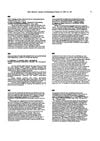 190 citations,
October 2002 in “The FASEB journal”
190 citations,
October 2002 in “The FASEB journal” Androgens may cause hair loss by increasing TGF-beta1 from scalp cells, which inhibits hair cell growth.
 69 citations,
April 2019 in “Biomedicines”
69 citations,
April 2019 in “Biomedicines” PRP and HF-MSCs treatment improves hair growth, thickness, and density in androgenetic alopecia.
 66 citations,
April 1995 in “The journal of cell biology/The Journal of cell biology”
66 citations,
April 1995 in “The journal of cell biology/The Journal of cell biology” A new protein was made to detect specific skin cell growth receptors and worked in normal skin but not in skin cancer cells.
 55 citations,
September 2017 in “Journal of Cosmetic Dermatology”
55 citations,
September 2017 in “Journal of Cosmetic Dermatology” Platelet-rich plasma, taken from a person's own blood, can help rejuvenate skin, stimulate hair growth, and treat hair loss, but more research is needed to confirm its safety and effectiveness.
 49 citations,
November 2014 in “Journal of Medicinal Food”
49 citations,
November 2014 in “Journal of Medicinal Food” Red Ginseng Extract may help human hair grow by activating growth pathways and blocking negative effects of certain hormones.
 49 citations,
July 2009 in “Fitoterapia”
49 citations,
July 2009 in “Fitoterapia” Essential oils from Chamaecyparis obtusa may help hair grow by increasing a growth-related gene.
 41 citations,
January 2007 in “Journal of Korean Medical Science”
41 citations,
January 2007 in “Journal of Korean Medical Science” Minoxidil and ATRA together boost hair growth more effectively than minoxidil alone.
 30 citations,
September 2004 in “Experimental Dermatology”
30 citations,
September 2004 in “Experimental Dermatology” Scalp hair follicle culture has limits for testing minoxidil's hair growth effects.
 28 citations,
May 2019 in “Life Sciences”
28 citations,
May 2019 in “Life Sciences” Ginsenoside Rb1 from Panax ginseng helps mink hair grow by activating certain cell signals.
 27 citations,
May 2017 in “Marine Drugs”
27 citations,
May 2017 in “Marine Drugs” Undariopsis peterseniana extract helps hair grow by activating certain cell growth pathways and could be a new treatment for hair loss.
 24 citations,
July 1994 in “Molecular Endocrinology”
24 citations,
July 1994 in “Molecular Endocrinology” Researchers found an RNA transcript that might help control a growth factor linked to tumor development.
 14 citations,
September 2018 in “International Journal of Molecular Sciences”
14 citations,
September 2018 in “International Journal of Molecular Sciences” Mackerel-derived fermented fish oil helps hair grow by activating growth pathways and increasing cell proliferation.
 13 citations,
June 2020 in “Stem Cells International”
13 citations,
June 2020 in “Stem Cells International” A substance from a specific gel helped to grow hair effectively in mice, suggesting it could potentially be used to treat hair loss in humans.
 13 citations,
July 2016 in “BMC Complementary and Alternative Medicine”
13 citations,
July 2016 in “BMC Complementary and Alternative Medicine” Hominis Placenta helps hair grow back by increasing cell growth and a specific growth factor.
 10 citations,
January 2021 in “Journal of Ginseng Research”
10 citations,
January 2021 in “Journal of Ginseng Research” Red ginseng oil may help grow hair and protect skin from UVC light.
 8 citations,
January 2016 in “Evidence-based Complementary and Alternative Medicine”
8 citations,
January 2016 in “Evidence-based Complementary and Alternative Medicine” Rumex japonicus extract may promote hair growth more effectively than Minoxidil.
 7 citations,
November 2022 in “Communications biology”
7 citations,
November 2022 in “Communications biology” Keratin injections can promote hair growth by affecting hair-forming cells and tissue development.
 4 citations,
June 2016 in “Journal of Pharmacopuncture”
4 citations,
June 2016 in “Journal of Pharmacopuncture” Cornu cervi pantotrichum pharmacopuncture solution helps mice grow hair by increasing hair follicle cell growth and a growth factor important for hair development.
 3 citations,
January 2021 in “Applied sciences”
3 citations,
January 2021 in “Applied sciences” Fermented red ginseng and a traditional herb mix improved hair growth in mice.
 January 2024 in “Journal of applied biological chemistry”
January 2024 in “Journal of applied biological chemistry” Glehnia littoralis and Andrographis paniculata extracts can significantly boost hair growth.
 September 2023 in “bioRxiv (Cold Spring Harbor Laboratory)”
September 2023 in “bioRxiv (Cold Spring Harbor Laboratory)” Freezing gamma-irradiated amniotic fluid may help hair growth and speed up the growth phase.
 July 1995 in “Journal of Dermatological Science”
July 1995 in “Journal of Dermatological Science” Cyclosporine starts hair growth faster, while minoxidil makes it last longer.
 220 citations,
March 2020 in “Advanced functional materials”
220 citations,
March 2020 in “Advanced functional materials” Biomaterials with MSC-derived substances could improve tissue repair and have advantages over direct cell therapy.
 161 citations,
August 2013 in “Journal of experimental botany”
161 citations,
August 2013 in “Journal of experimental botany” Certain inhibitors slow down plant growth by causing early cell specialization without changing the cell development pattern.
 72 citations,
February 2011 in “American Journal of Biological Anthropology”
72 citations,
February 2011 in “American Journal of Biological Anthropology” The conclusion is that recognizing hair growth cycles can improve the precision of dietary and health assessments from hair analysis.
 48 citations,
June 2013 in “Journal of Dermatological Science”
48 citations,
June 2013 in “Journal of Dermatological Science” Valproic acid may help hair grow and could be a safe treatment for hair loss.
 46 citations,
August 2003 in “The journal of investigative dermatology/Journal of investigative dermatology”
46 citations,
August 2003 in “The journal of investigative dermatology/Journal of investigative dermatology” Phosphatidic acid may help hair grow by affecting cell growth pathways.
 22 citations,
October 2020 in “Frontiers in Cell and Developmental Biology”
22 citations,
October 2020 in “Frontiers in Cell and Developmental Biology” Fisetin, a type of polyphenol, may help hair grow by increasing certain protein activities in cells.
 19 citations,
January 2016 in “Biological & Pharmaceutical Bulletin”
19 citations,
January 2016 in “Biological & Pharmaceutical Bulletin” Sargassum muticum extract and its component apo-9'-fucoxanthinone may help hair growth and treat hair loss.
 18 citations,
July 2016 in “Medicine”
18 citations,
July 2016 in “Medicine” Wnt/β-catenin and TGF-β pathways affect hair loss, and activating Wnt/β-catenin could be a potential treatment.





























